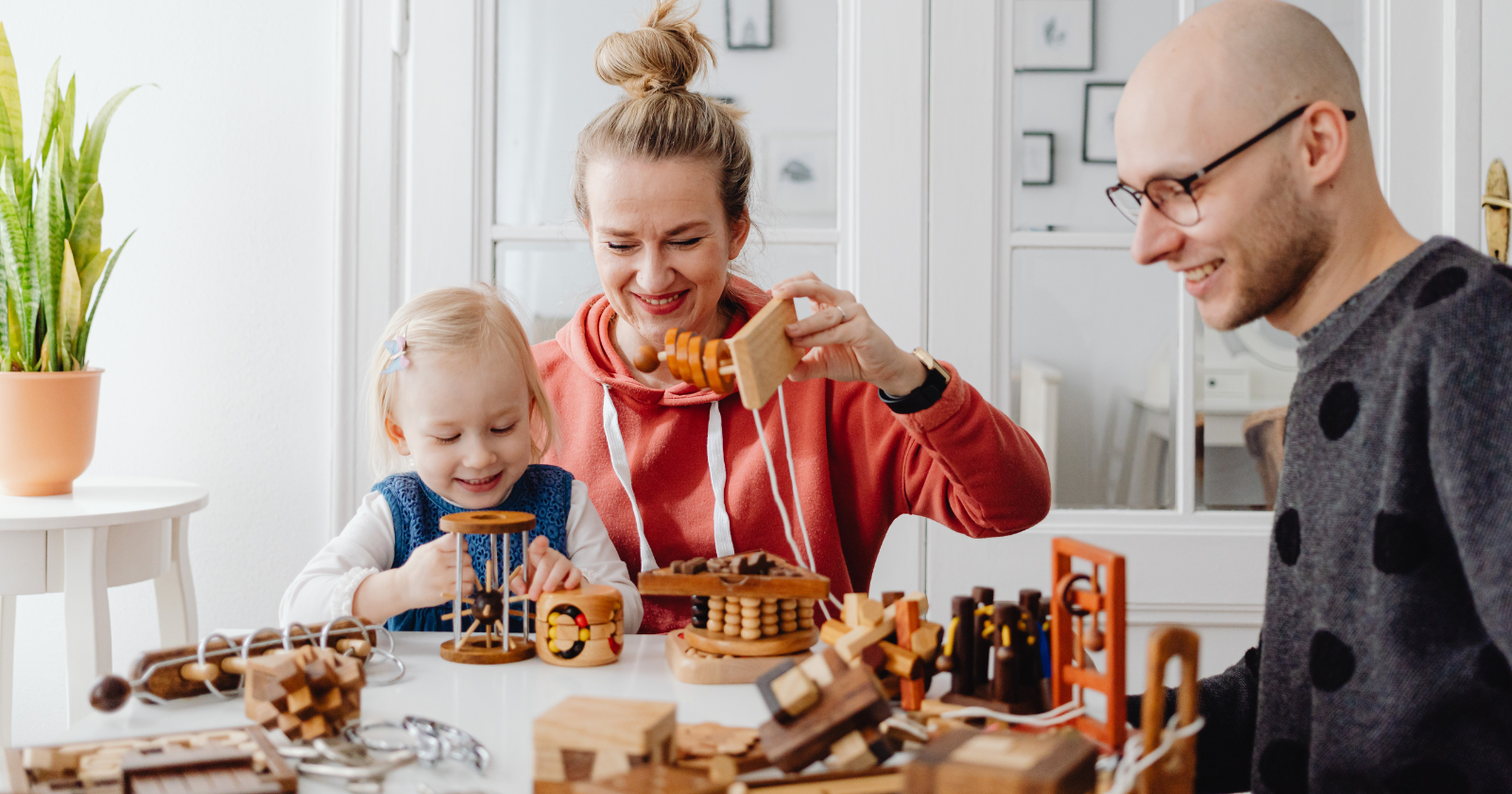For a long time, I thought a clean home was the same thing as a happy one. The floors had to sparkle, the counters had to shine, and the toys had to be neatly tucked away before I could exhale.
But as my kids grew, I started noticing something.
The liveliest, warmest memories didn’t happen in the tidy moments.
They happened in the messy ones, the pancake batter splattered on the walls, the impromptu living room concerts, the late-night laughter echoing over half-folded laundry.
These days, when I think about what really makes a home happy, it has less to do with what you can see and more to do with what you can feel.
A happy home isn’t defined by spotless spaces but by a sense of safety, play, and belonging.
Over the years, and through a few well-earned lessons, I’ve noticed that the happiest family homes tend to do a few things differently.
1. They make room for play
Play is the heartbeat of family life. It’s how kids learn, express themselves, and feel connected to the people they love most.
Some of my favorite memories with my sons weren’t planned. They were built out of cardboard forts, kitchen dance-offs, and evenings spent chasing our dog around the yard.
Those moments weren’t productive in the traditional sense, but they built something stronger than structure, they built joy.
Experts agree that play isn’t just a nice extra; it’s essential.
As Dr. Michael Yogman, MD, has noted, “Play with parents and peers is fundamentally important for developing a suite of 21st-century skills, including social, emotional, language and cognitive skills… The benefits of play cannot really be overstated in terms of mitigating stress, improving academic skills and helping to build the safe, stable and nurturing relationships that buffer against toxic stress and build social-emotional resilience.”
Related Stories from The Artful Parent
That’s a long way of saying what every child instinctively knows: play is the language of love.
2. They welcome mess as part of learning
I used to think mess meant I wasn’t doing enough as a mom.
But the truth is, mess is proof of life. Paint on the table, flour on the counter, or Lego pieces underfoot are signs that creativity is happening.
When I let go of the need to keep everything in order, our home became more relaxed, and so did I.
I realized my kids were learning in those moments, experimenting, discovering what worked and what didn’t.
Perfection, I discovered, leaves little room for imagination.
- I worked in luxury retail for 12 years, these 7 things customers do that instantly tell staff they can’t actually afford to shop there - Global English Editing
- 8 things low-class people think are luxury that actually scream lack of sophistication - Global English Editing
- Psychology says people who hold the elevator for someone rushing display these 8 traits, and it’s one of the clearest signs of strong character - Global English Editing
Now that my children are grown, the walls are cleaner and the floors stay clear for longer, but I sometimes miss those little signs of chaos.
3. They let kids help, even when it slows things down
When my sons were little, I could clean the kitchen in fifteen minutes flat. If they “helped,” it took triple the time, and that was on a good day.
But those messy, drawn-out moments turned out to be some of the most valuable ones.
Research suggests that kids who start helping out with small chores by age 4 or 5 tend to have more self-confidence and a stronger sense of capability.
Letting them wipe spills, set the table, or feed the dog teaches far more than practical skills. It shows them that they are trusted and capable members of the family.
Sure, the towels may not be folded perfectly, and the floor might get wetter when they mop, but that’s how they learn.
More importantly, that’s how they start to take pride in contributing to something bigger than themselves.
4. They apologize and forgive freely
One of the most powerful things a parent can say is, “I’m sorry.”
I learned this the hard way after snapping at my middle son during a stressful morning. Later that evening, I sat beside him and admitted I’d been impatient and wrong.
He looked at me, surprised, and simply said, “It’s okay, Mom.”
That exchange taught me something I never forgot. Apologies don’t make us smaller in our children’s eyes. They make us more human.
When parents own their mistakes, it models humility and responsibility. It shows kids that relationships don’t crumble when things go wrong; they grow stronger through honesty and repair.
Forgiveness, after all, is something we teach best by example.
5. They talk and listen, really listen
Family conversations are where connection takes root. I remember countless dinners filled with stories, laughter, and sometimes, quiet pauses when one of my boys was working through something tough.
Listening deeply doesn’t mean rushing in to fix or preach. It means being present enough for a child to feel heard. I’ve come to believe that one of the simplest ways to build trust is to say, “Tell me more.”
Those conversations taught me that listening is an act of love. It tells our kids, “Your thoughts matter here.” And that message stays with them long after the dishes are cleared.
6. They make time for each other, not just schedules
Every family I know seems to juggle endless to-do lists, work, school, errands, sports, homework.
But the happiest homes carve out time that isn’t planned to the minute.
When my sons were younger, we had what we called “slow Sundays.” No alarms, no agendas.
We’d cook pancakes, walk the dog, or simply sit around talking about the week. Those mornings became anchors in our busy lives.
Happiness, I realized, doesn’t always come from big family vacations or perfectly planned days.
It grows quietly in the small, repeated rituals that tell everyone, “We belong here, together.”
7. They allow feelings to exist
It’s not always easy to sit with a child’s big emotions, especially when you’re exhausted and just want peace.
But I’ve learned that trying to silence tears or frustration often makes them louder in the long run.
When my youngest came home in tears after a rough day at school, my instinct was to cheer him up. Instead, I took a breath and said, “That sounds really hard.”
He nodded, still sniffling, but eventually opened up. That moment reminded me that children don’t need perfect answers. They need permission to feel.
This idea was beautifully echoed in something I read recently by Rudá Iandê in his book Laughing in the Face of Chaos. He wrote, “Fear, when understood, is not our enemy. It’s an intrinsic part of the human experience.” Those words struck a chord.
His insights reminded me that emotions like fear, sadness, and frustration aren’t signs of failure in family life. They’re part of being human together.
By letting feelings exist without shame or rush, we teach our kids that emotional honesty is a strength, not a burden.
8. They celebrate the small, ordinary moments
When I think back on my happiest days as a mother, they rarely involved grand plans or perfect timing.
They were the nights when everyone piled on the couch for a movie, the mornings when laughter filled the kitchen, or the quiet bedtime moments when a sleepy “I love you” felt like the whole world slowing down.
Happiness in a family isn’t built on perfect days. It’s built on ordinary ones that we choose to notice.
The more I slowed down to appreciate those small things, the more I saw how much love was already there, woven into the mess, the noise, and the beautifully imperfect rhythm of daily life.
Final thoughts
Our homes tell the story of how we live, but more importantly, how we love.
For a long time, I chased order and neatness, believing they would bring peace.
But the real peace came from something else entirely, from laughter, forgiveness, and the permission to simply be ourselves under one roof.
As I look around my home now, there are no more toys or school papers scattered about.
But there’s still life here, my eldest son’s spare helmet resting on a chair, my middle son’s biking gear by the door, and a book my youngest left behind on his last visit.
It’s not perfect, but it feels real, lived-in, and full of quiet warmth.
The happiest family homes aren’t the ones that look picture-perfect. They’re the ones where people can play, make mistakes, talk openly, and love without conditions.
So, if your home feels a little chaotic right now, take heart. The mess might just be the evidence of something wonderful happening, life in full bloom.



